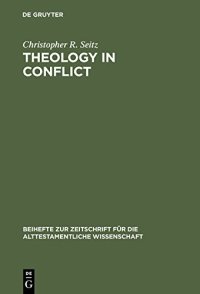
Ebook: Theology in Conflict: Reactions to the Exile in the Book of Jeremiah
Author: Christopher R. Seitz
- Genre: History
- Tags: Old Testament Commentaries Bible Study Reference Criticism Interpretation Assyria Babylonia Sumer Ancient Civilizations History Foreign Language Instruction Dictionaries Thesauruses Test Preparation Religion Spirituality Agnosticism Atheism Buddhism Hinduism Islam Judaism Literature Fiction New Age Other Eastern Religions Sacred Texts Practices Religious Art Studies Supernatural Paranormal Worship Devotion Christianity Comparative Humanities Used Rental Textbooks Specialty Boutique
- Series: Beihefte zur Zeitschrift für die alttestamentliche Wissenschaft 176
- Year: 1989
- Publisher: Walter de Gruyter
- Language: English
- pdf
This work, the revision of a dissertation presented at Yale in 1986, is a social-historical study of the kingdom of Judah from the point of view of factions and conflicts within that society. Seitz surveys evidence for social conflict from Hezekiah’s time, with a meticulous concern for such conflict after the death of Josiah and until the fall of Jerusalem in 587. As his subtitle indicates, he takes particular care to discover conflicting views in the literary layers of the book of Jeremiah. In this pursuit Seitz is working the same direction as Abraham Malamat has worked (“The Twilight of Judah in the Egyptian-Babylonian Maelstrom," VTSup 28 [1974] 123-45).
In general his conclusions are cogent ones. He identifies the “people of the land” as (the leaders of) the population within Jerusalem who had been refugees — from the north in 721, and from outlying areas of Judah during the Assyrian occupation in 701. It was this group that put Josiah on the throne in 640 (where in this process, Seitz wonders, were Josiah’s uncles and brothers?—p. 40), and it was from this group that the book of Deuteronomy came (pp. 69-70). When Josiah was killed at Megiddo, he had been trying to oppose Egyptian hegemony (pp. 78-79). The “people of the land,” attempting to continue an anti-Egyptian policy and ignoring primogeniture, then put Jehoahaz on the throne (p. 81). The Egyptians responded by removing Jehoahaz from the throne and taking him into custody, replacing him with Jehoiakim, an older brother, as a vassal. All these irregularities in the succession of kings point to tensions within the society (p. 88). After the battle of Carchemish in 605, as we know, Jehoiakim changed his allegiance and became a vassal to Babylon (Seitz assumes in 603, p. 95) and then, after Babylonian reversals in the Egyptian delta, he broke with Babylon (Seitz assumes in 600, p. 96). Seitz proposes that the silence over the circumstances of Jehoiakim’s death (2 Kgs 24:6) was deliberate, particularly given the contrasting judgments between Ezekiel and Jeremiah over the avenue of continuity in the Davidic dynasty (p. 119).
In general his conclusions are cogent ones. He identifies the “people of the land” as (the leaders of) the population within Jerusalem who had been refugees — from the north in 721, and from outlying areas of Judah during the Assyrian occupation in 701. It was this group that put Josiah on the throne in 640 (where in this process, Seitz wonders, were Josiah’s uncles and brothers?—p. 40), and it was from this group that the book of Deuteronomy came (pp. 69-70). When Josiah was killed at Megiddo, he had been trying to oppose Egyptian hegemony (pp. 78-79). The “people of the land,” attempting to continue an anti-Egyptian policy and ignoring primogeniture, then put Jehoahaz on the throne (p. 81). The Egyptians responded by removing Jehoahaz from the throne and taking him into custody, replacing him with Jehoiakim, an older brother, as a vassal. All these irregularities in the succession of kings point to tensions within the society (p. 88). After the battle of Carchemish in 605, as we know, Jehoiakim changed his allegiance and became a vassal to Babylon (Seitz assumes in 603, p. 95) and then, after Babylonian reversals in the Egyptian delta, he broke with Babylon (Seitz assumes in 600, p. 96). Seitz proposes that the silence over the circumstances of Jehoiakim’s death (2 Kgs 24:6) was deliberate, particularly given the contrasting judgments between Ezekiel and Jeremiah over the avenue of continuity in the Davidic dynasty (p. 119).
Download the book Theology in Conflict: Reactions to the Exile in the Book of Jeremiah for free or read online
Continue reading on any device:

Last viewed books
Related books
{related-news}
Comments (0)